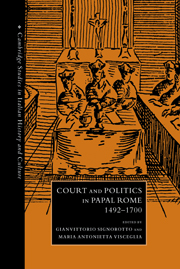Book contents
- Frontmatter
- Contents
- List of abbreviations
- Introduction
- 1 A turning-point in the history of the factional system in the Sacred College: the power of pope and cardinals in the age of Alexander VI
- 2 Court and city in the ceremony of the possesso in the sixteenth century
- 3 ‘Rome, workshop of all the practices of the world’: from the letters of Cardinal Ferdinando de' Medici to Cosimo I and Francesco I
- 4 The ‘world's theatre’: the court of Rome and politics in the first half of the seventeenth century
- 5 Factions in the Sacred College in the sixteenth and seventeenth centuries
- 6 The Secretariat of State as the pope's special ministry
- 7 The cardinal-protectors of the crowns in the Roman curia during the first half of the seventeenth century: the case of France
- 8 The squadrone volante: ‘independent’ cardinals and European politics in the second half of the seventeenth century
- 9 Roman avvisi: information and politics in the seventeenth century
- 10 Hegemony over the social scene and zealous popes (1676–1700)
- Index
- CAMBRIDGE STUDIES IN ITALIAN HISTORY AND CULTURE
9 - Roman avvisi: information and politics in the seventeenth century
Published online by Cambridge University Press: 09 July 2009
- Frontmatter
- Contents
- List of abbreviations
- Introduction
- 1 A turning-point in the history of the factional system in the Sacred College: the power of pope and cardinals in the age of Alexander VI
- 2 Court and city in the ceremony of the possesso in the sixteenth century
- 3 ‘Rome, workshop of all the practices of the world’: from the letters of Cardinal Ferdinando de' Medici to Cosimo I and Francesco I
- 4 The ‘world's theatre’: the court of Rome and politics in the first half of the seventeenth century
- 5 Factions in the Sacred College in the sixteenth and seventeenth centuries
- 6 The Secretariat of State as the pope's special ministry
- 7 The cardinal-protectors of the crowns in the Roman curia during the first half of the seventeenth century: the case of France
- 8 The squadrone volante: ‘independent’ cardinals and European politics in the second half of the seventeenth century
- 9 Roman avvisi: information and politics in the seventeenth century
- 10 Hegemony over the social scene and zealous popes (1676–1700)
- Index
- CAMBRIDGE STUDIES IN ITALIAN HISTORY AND CULTURE
Summary
The hand-written newsletters – known in Europe by various names: avvisi, reporti, gazzette, ragguagli, nouvelles, advis, corantos, courantes, zeitungen, etc. – were the fastest and most efficient means by which military and political news could be circulated between 1500 and 1700. From the middle of the sixteenth century, the newsletter writers, variously called menanti, reportisti or, more generally, gazzettieri (gazetteers), depending on where they came from, set up regular news services, a regularity dictated by the postal service network which by then had spread to embrace the whole continent. These services could be used in different ways, at different (pre-set) costs, which varied in relation to the type and quality of service required.
In this period, these hand-written newsletters often served as the basis upon which European ambassadors would draw up and write the dispatches they sent back to their respective courts, each ambassador interpreting and dealing with the avviso according to specific diplomatic traditions: some would enclose them along with an account of the current political situation of the country, others would rewrite them or work them directly into the dispatch.
It did not take long for the newsletters to filter out from the chancelleries and spread throughout society. Indeed, they influenced the first stirrings of public opinion that began to appear during the course of the seventeenth century, if one can indeed use the term ‘public opinion’ in relation to this historical period.
- Type
- Chapter
- Information
- Court and Politics in Papal Rome, 1492–1700 , pp. 212 - 228Publisher: Cambridge University PressPrint publication year: 2002
- 5
- Cited by



